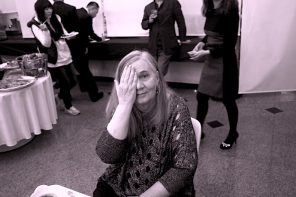What inspired you to write Progressive and Religious? What sparked your interest?
I wrote this book because, like many Americans, I was weary of the divisive and destructive role of religion in the public square. I grew up Southern Baptist in Mississippi and was attending a Southern Baptist seminary when it was taken over by the fundamentalist wing of the denomination. So I’ve experienced firsthand the dark side of religion that emerges when religious leaders become obsessed with power and align themselves with one political party. Like so many others, I’ve also known that the most prominent religious leaders covered by the media in recent years don’t represent the majority of religious Americans. This book is the culmination of a three-year journey to find “the other religious America,” one where religion functions as a force to bring people together to work for justice and the common good.
What’s the most important take-home message for readers?
The most important message in this book is that there is an emerging, vibrant, progressive religious movement in America. This will be good news to so many Americans who have become frustrated with the troubled relationship between religion and politics: an exclusive claim on faith and values from the right and a radical divorce of faith from politics on the left. But this new group of religious leaders is reenvisioning religion in public life and blazing a trail that goes beyond partisan politics to work for a more just and inclusive society.
Is there anything you had to leave out?
The toughest things I left out of the book were so many of the exceptionally rich interviews I conducted with nearly 100 religious leaders over the last three years. That process produced over 100 hours of audio and 1,700 single-spaced pages of transcripts. The text of my book, which draws on these interviews to tell the story of this emerging progressive religious movement, is only 191 pages long. So, although all of the interviews informed the book, and I include larger quotes in the book so that the voices of these leaders come through, not all are cited in the book. So much rich material had to stay on the cutting room floor. One way I’ve compensated for this is by creating downloadable audio podcasts of selected interviews with these religious leaders [three of these can be found on Dr. Jones’ RD archive]. They can be found under “Progressive Religious Voices” on iTunes and on the Web site companion to the book.
What are some of the biggest misconceptions about your topic?
The entire book is aimed at correcting the mistaken assumption that a person cannot be authentically religious and politically progressive. On the political side, too many people have been given the impression that if they are politically progressive, they must choose between their politics and their faith. On the religion side, too many religious people—even religious progressives—have held the misconception that the only authentic forms of religion are fundamentalist. My book shows that across religious traditions, a new breed of leaders are helping their constituents see the connections between even very traditional religious beliefs and practices and progressive politics. For some, engagement with religious beliefs and practice has led them toward progressive politics; for others, involvement in progressive politics has led them toward a more serious engagement with their religious tradition. But there is clearly a new ferment, a reawakening, that is strengthening these connections.
Did you have a specific audience in mind when writing?
I have several audiences in mind. First, I hope reporters will take note of this new movement and finally give these leaders their due in the press. We’re getting there, but the media largely still has last generation’s battle leaders on their speed-dial, and they’re missing the new story about religion in public life. Second, two other key audiences were political progressives who were wary of religion and religious people who were wary of progressive politics. I hope the book will help political progressives continue to be more open to people of faith as genuine partners. And I hope the book also helps religious people, who have been uncomfortable when they have been told that their faith only applies to a few hot-button issues, find encouragement in these pages and add their voices to the growing chorus. Finally, I hope these new voices will contribute to a healthier public square and a more vibrant, pluralistic democracy in America.
Are you hoping to just inform readers? Give them pleasure? Piss them off?
If there are two groups I’m taking aim at, it’s the Christian Right that has distorted religion into a partisan agenda on the one hand and the raft of neo-atheist authors that are asserting—largely in (over)reaction to this first group—that “religion poisons everything” on the other. I firmly believe that the best solution to bad religion is good religion. Given the ugly and divisive side of religion that has been so prominent in American politics, I understand the appeal of these neo-atheist books. They’ve been at the top of the best-seller lists (in the category of religion no less!) because they have tapped into a backlash. However, they make the mistake of rejecting all religion because of bad religion. From a political point of view, they also ignore the fact that nearly 9 in 10 Americans are religious, and the vast majority say religion is very important in their lives. Progressive religious voices have been with us at key moments in our national life—the abolitionist movement, the peace movement, the civil rights movement—and they are still here today. One way of reading my book is as a performative response to these authors that brings the reader into conversation with voices that are both authentically religious and politically progressive.
What alternative title would you give the book?
My original, shorter subtitle for the book was, “the new face of religion in American public life.” I agree with prominent commentators such as E.J. Dionne that—the Palin nomination notwithstanding—we are seeing the end of the era of the religious right. In fact, what we saw in 2004 was an overreaching by the religious right—by aligning with the Republican Party and narrowing religious concerns to a few hot-button issues—that has created the opportunity for a correction we’ve desperately needed for some time. There is an exciting new public face of religion emerging that is pluralistic, deeply religious, and committed to working across lines that divide us to work for justice and the common good.
This new face of religion is certainly important for people who care about religion. But politically progressive people should care about this new religious movement—primarily because it is genuinely progressive. Every major movement for social change in this country has had religious leaders in the leadership. By trying to avoid religion and deeply held values—either because of a reaction to the Religious Right or out of a wish not to exclude anyone—progressives have too often lost the moral power of our message. I’ve heard too many progressives trying to persuade people with statistics and a laundry list of policies. But a powerful prophetic religious voice can provide a strong critique of what is wrong and broken in our society, and the passion to inspire people to step up and make sacrifices to work for real change.
How do you feel about the cover?
I’m happy with the cover, especially the main title, “Progressive & Religious,” in large orange stylized script. We decided to go without any cover images, mostly because it was difficult to think about an image that would adequately capture the energy and diversity of this new movement. Images of the Civil Rights era, the last time progressive religious voices fully captured the public imagination, seemed dated and didn’t include the newer presence of progressive Muslims and Buddhists. Religious symbols from the four traditions covered in the book (Judaism, Christianity, Islam, and Buddhism) seemed too static—these new leaders are in motion, shaking things up.
Is there a book out there that you wish you had written?
Two books that stand out are Jeff Stout’s Democracy and Tradition and Michael Walzer’s Politics and Passion. Both of these books push back on secularists who want to ban religion from the public square. While they both take seriously the real potential dangers of theocratic tendencies of some religious citizens, they make the case that progressives may have more to lose than to gain from this defensive stance. What I admire in both Stout and Walzer are the subtlety of their thoughts and their ability to write public philosophy that combines rigor and sensitivity with a firm grasp of practical problems. Marilynne Robinson’s Gilead is also a beautiful, insightful read that grasps the cadence and complexity of lived religion.
What’s your next book?
Like having children, it’s always tough to think about the next one when the current one has just come into the world. But here’s my current thinking. My first two books were based on qualitative interviews: the current one among religious leaders and the previous book, Liberalism’s Troubled Search for Equality: Religion and Cultural Bias in the Oregon Physician-assisted Suicide Debates, among both activists and religious leaders.
As it stands, I’m thinking my next book will be more quantitative, drawing on survey data between 2000 and 2008. The book will focus on the sea change in the public face of religion during the first decade of the twenty-first century, looking at 2004-2005 as the high water mark of the dominance of the Christian Right. We already see the patterns in the closing of the so-called “God gap” (the Republican advantage among white weekly church attenders), more progressive attitudes on gay and lesbian issues over time, measures of political parties’ “friendliness to religion,” and other similar measures. I’ll draw on major national surveys conducted by my firm, Public Religion Research, along with other data from the Pew Forum on Religion.




